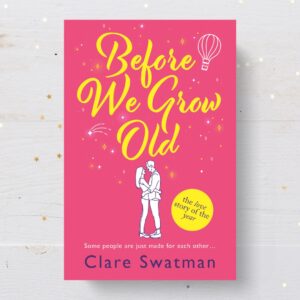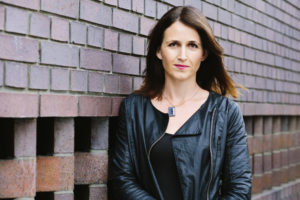 It’s so hard to pick a favourite scene from any book, so for this, I’m plumping for the very first scene in my latest book, Before We Grow Old – partly because I like it and partly so I don’t give anything else away! In this opening scene, Fran and Will bump into each other by chance in a busy London cafe – and the last time they’d seen each other had been 25 years before, when they’d been teenagers in love. Here’s the moment they meet:
It’s so hard to pick a favourite scene from any book, so for this, I’m plumping for the very first scene in my latest book, Before We Grow Old – partly because I like it and partly so I don’t give anything else away! In this opening scene, Fran and Will bump into each other by chance in a busy London cafe – and the last time they’d seen each other had been 25 years before, when they’d been teenagers in love. Here’s the moment they meet:
The next few seconds were a scramble of wiping the table and floor, and apologising and stammering. Which is why it took me so long to actually look at the man who’d accidentally bumped into me in this busy café. I noticed his mop of expensively cut blonde hair first, peppered with streaks of grey and tousled into subtle spikes. Then I noticed his smile: the friendly mouth and glistening white teeth, followed by his sparkling blue eyes, which lit up as he looked at me.
‘Oh…’ I stammered, and almost fell into my seat, my mouth open like a goldfish.
‘Fran?’
‘Will.’ I stared at him for a moment too long. ‘I – do you want to sit down? I think it’s dry now.’ I looked at him again and indicated the seat opposite me as my stomach rolled over. ‘If you have time, of course.’
 I enjoyed imagining what it might feel like to suddenly be confronted by someone who you’d not only loved so deeply, so obsessively, but who had hurt you so badly when they’d upped and left that it had affected you for the rest of your life. It’s not necessarily something that you would think about every day, but the way something like that makes you feel definitely has an impact on the way you see things, and the way you react to people. There’s always a before and an after to any kind of heart-breaking moment, and I really wanted to get it right.
I enjoyed imagining what it might feel like to suddenly be confronted by someone who you’d not only loved so deeply, so obsessively, but who had hurt you so badly when they’d upped and left that it had affected you for the rest of your life. It’s not necessarily something that you would think about every day, but the way something like that makes you feel definitely has an impact on the way you see things, and the way you react to people. There’s always a before and an after to any kind of heart-breaking moment, and I really wanted to get it right.
I enjoyed imagining how awkward Will and Fran might both have felt after Will bumped into her, and left hot chocolate dripping all over the floor; the realisation that they knew each other, that they’d loved each other once. I wanted to capture how Fran might have felt such a conflicting range of emotions, from excitement to shock to anger to embarrassment, all within the space of just a few seconds. And although I wanted them both to feel awkward at first, I also wanted to let them have a conversation, to talk to each other – and they do just that, even if they end up skirting round what they really want to say. Here’s where I think it sums it up best:
 I blew across the top of my hot chocolate, watching as the cool air skimmed across the foamy surface. Okay, so he’d decided not to talk about the past. That was fine with me. More than fine, in fact. That was good. It was too early to be raking over old ground. Besides, what would be the point?
I blew across the top of my hot chocolate, watching as the cool air skimmed across the foamy surface. Okay, so he’d decided not to talk about the past. That was fine with me. More than fine, in fact. That was good. It was too early to be raking over old ground. Besides, what would be the point?
And yet my hands still gripped my mug so tightly that my knuckles turned white, as the words I wanted to ask him hung in the air between us, unsaid.
I hope this makes it clear that there are lots of things that are unsaid between them – and that this is the launchpad for the rest of the story!


